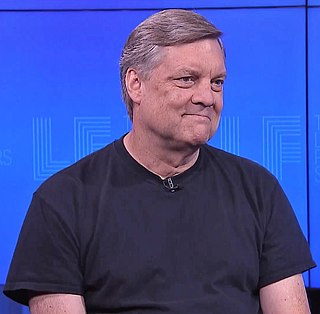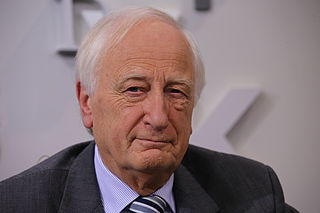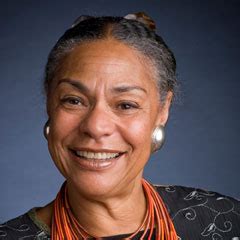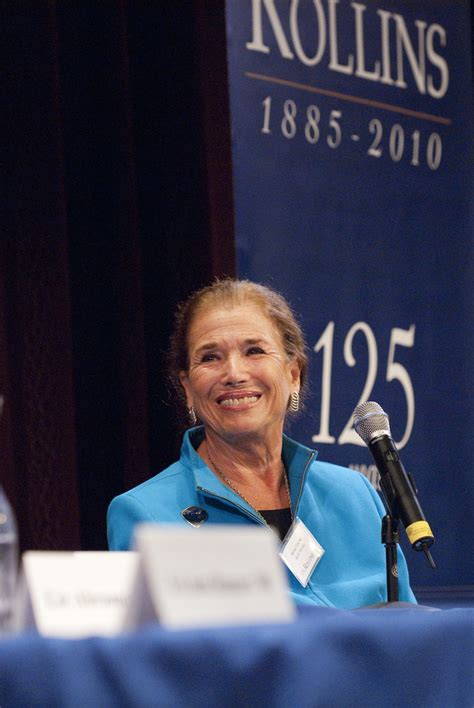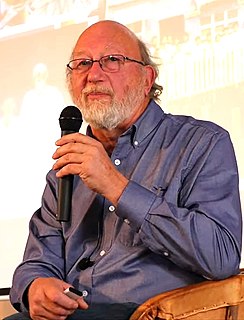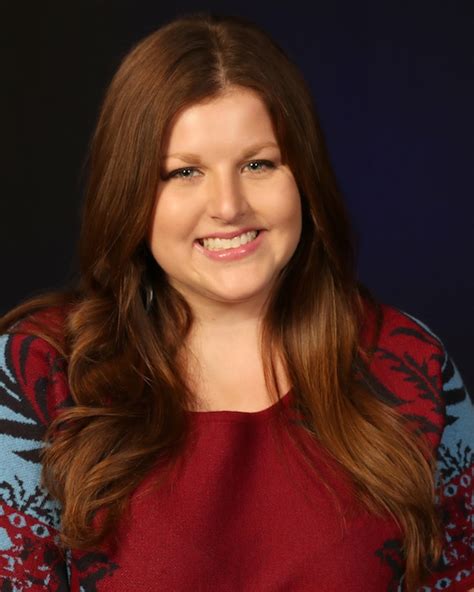Top 342 Authoritarian Quotes & Sayings - Page 6
Explore popular Authoritarian quotes.
Last updated on April 21, 2025.
Defining and celebrating the New Father are by far the most popular ideas in our contemporary discourse on fatherhood. Father as close and nurturing, not distant and authoritarian. Fatherhood as more than bread winning. Fatherhood as new-and-improved masculinity. Fathers unafraid of feelings. Fathers without sexism. Fatherhood as fifty-fifty parenthood, undistorted by arbitrary gender divisions or stifling social roles.
I suppose authoritarians don't like being made fun of because authoritarian rulers have a very inflated sense of themselves and don't like being deflated, which makes it all the more important to continue to deflate them. These are very courageous people around the world who poke fun from inside these societies. So, we now have to broaden the definition of what we mean by "writer" to include bloggers, cartoonists, song writers, visual artists - all these people are, in different ways, quite brave.
Odonianism is anarchism. Not the bomb-in-the-pocket stuff, which is terrorism, whatever name it tries to dignify itself with, not the social-Darwinist economic 'libertarianism' of the far right; but anarchism, as prefigured in early Taoist thought, and expounded by Shelley and Kropotkin, Goldman and Goodman. Anarchism's principal target is the authoritarian State (capitalist or socialist); its principle moral-practical theme is cooperation (solidarity, mutual aid). It is the most idealistic, and to me the most interesting, of all political theories.
I think the twenty-first century happened, basically. That this century started on 9/11. And basically, it's been a century of counter reaction to globalization and the meritocracy. And a good century for 72 nations have gotten more authoritarian. We've had Brexit. We have Le Pen rising in France. We've just got a lot of these types all around the world. And the people who are suffering from globalization and the meritocracy are saying, "No more. You know, we get a voice too."
As I travel through my country, people often ask me how it feels to have been imprisoned in my home -first for six years, then for 19 months. How could I stand the separation from family and friends? It is ironic, I say, that in an authoritarian state it is only the prisoner of conscience who is genuinely free. Yes, we have given up our right to a normal life. But we have stayed true to that most precious part of our humanity-our conscience.
People tend to assess the relative importance of issues by the ease with which they are retrieved from memory—and this is largely determined by the extent of coverage in the media. Frequently mentioned topics populate the mind even as others slip away from awareness. In turn, what the media choose to report corresponds to their view of what is currently on the public’s mind. It is no accident that authoritarian regimes exert substantial pressure on independent media. Because public interest is most easily aroused by dramatic events and by celebrities, media feeding frenzies are common
The difference between [socialism and fascism] is superficial and purely formal, but it is significant psychologically: it brings the authoritarian nature of a planned economy crudely into the open. The main characteristic of socialism (and of communism) is public ownership of the means of production, and, therefore, the abolition of private property. The right to property is the right of use and disposal. Under fascism, men retain the semblance or pretense of private property, but the government holds total power over its use and disposal.
When people become frightened, they look for things of real value. They will go to monetary metals, gold and silver, and they will buy other things, such as buying property. But no matter what we have, whether we have our gold coins or we have our property, if we have an authoritarian government, that is our greatest threat. So, I would like to think that there is no perfect protection, other than shrinking the size and scope and power of government, so that we can be left alone and take care of ourselves.
[Christian rebellion] arises from the doctrine of mankind made in the image of God, and therefore protests against all forms of dehumanization. It sets itself against the social injustices which insult God the Creator, seeks to protect human beings from oppression and longs to liberate them… it protests against every authoritarian regime, whether of the left or of the right, which discriminates against minorities, denies people their civil rights, forbids the free expression of opinions or imprisons people for their views alone.
The character structure of modern man, who reproduces a six-thousand-year-old patriarchal authoritarian culture is typified by characterological armoring against his inner nature and against the social misery which surrounds him. This characterolgical armoring of the character is the basis of isolation, indigence, craving for authority, fear of responsibility, mystic longing, sexual misery, and neurotically impotent rebelliousness.
When the newly formed middle class in China begins to perceive its interests and discovers the value of the rule of law, the existing power structure will lose its foundation. It is a process that no government can put a stop to in the long term. That also applies to some Arab countries, with some limitations. But we have to be patient. In the 1980s, nobody expected that the freedom movement in Poland would lead to the collapse of entire Eastern Bloc. That's why it would be a huge mistake were we to believe that authoritarian systems were indestructible.
It is true that authoritarian governments increasingly see the internet as a threat in part because they see the US government behind the internet. It would not be accurate to say they are reacting to the threat posed by the internet, they are reacting to the threat poised by United States via the internet. They are not reacting against blogs, or Facebook or Twitter per se, they are reacting against organizations like the National Endowment for Democracy funding bloggers and activists.
The developed world should neither shelter nor militarily destabilize authoritarian regimes unless those regimes represent an imminent threat to the national security of other states. Developed states should instead work to create the conditions most favorable for a closed regime's safe passage through the least stable segment of the J curve however and whenever the slide toward instability comes. And developed states should minimize the risk these states pose the rest of the world as their transition toward modernity begins.
The Bible is not considered an accurate, absolute, authoritative, or authoritarian source but a book to be experienced and one experience can be as valid as any other can. Experience, dialogue, feelings, and conversations are equated with Scripture while certitude, authority, and doctrine are to be eschewed! No doctrines are to be absolute and truth or doctrine must be considered only with personal experiences, traditions, historical leaders, etc. The Bible is not an answer book.
The thing about drugs is that it [dealing] gives people an income to deal with, and it also gives people a compelling drama in their lives that they used to get from the office and the factory, and they're no longer there. What happens if you have everything in the hands of the state, particularly in the line of an authoritarian state, they just give people drugs to keep them doped up, to keep them passive.
I want a revamped feminism. Putting the vamp back means the lady must be a tramp. My generation of the Sixties rebels wanted to smash the bourgeois codes that had become authoritarian totems of the Fifties. The 'nice' girl with her soft, sanitized speech and decorous manners had to go. Thirty years later, we're still stuck with her - in the official spokesmen and the anointed heiresses of the feminist establishment.
Donald Trump is sort of an Orwellian figure, an authoritarian figure who is twisting words in an Orwellian manner, "1984," to exercise power and control people's minds, or is he a 5-year-old who has an ego that needs to be fed, and the universe has to warp around his ego needs so he can feel good about himself, and everybody has to produce photos to make the monarch feel like he's made of gold.
Dissonance between family and school, therefore, is not only inevitable in a changing society; it also helps to make children moremalleable and responsive to a changing world. By the same token, one could say that absolute homogeneity between family and school would reflect a static, authoritarian society and discourage creative, adaptive development in children.
No one can learn tolerance in a climate of irresponsibility, which does not produce democracy. The act of tolerating requires a climate in which limits may be established, in which there are principles to be respected. That is why tolerance is not coexistence with the intolerable. Under an authoritarian regime, in which authority is abused, or a permissive one, in which freedom is not limited, one can hardly learn tolerance. Tolerance requires respect, discipline, and ethics.
Through an unwieldy combination of big government, big military, big business, big labor and big cities, we have created an unworkable mega-nation which defies central management and control. Not only is the United States too big, but it has also become too authoritarian and too undemocratic, and its states assume too little responsibility for the solution of their own social, economic, and political problems.
Every politician deep inside is authoritarian. If the person doesn't have ambition, that's not a politician. Society needs to put every ambitious, every effective politician into such a position that it helps - that this person helps improve society. That's why I'm always talking about need to change the system rather than should we go with Navalny or Gudkov or Yavlinsky or Khodorkovsky. We all have our ambitions. We're all ambitious people.
Women lead in ways different from men's. Men, I think, have been programmed to give orders. Women have been programmed to motivate people, to educate them, to bring out the best in them. Ours is a less authoritarian leadership. I think women tend to play hardball less often. This is the trend of office politics anyway: the days of warring factions are over. We're talking now in terms of cooperation, and I think that is the game women play best.
The authoritarian child-rearing style so often found in working-class families stems in part from the fact that parents see aroundthem so many young people whose lives are touched by the pain and delinquency that so often accompanies a life of poverty. Therefore, these parents live in fear for their children's future--fear that they'll lose control, that the children will wind up on the streets or, worse yet, in jail.
No wonder psychedelics are threatening to an authoritarian religious hierarchy. You don’t need faith to benefit from a psychedelic experience, let alone a priest or even a shaman to interpret it. What you need is courage—courage to drink the brew, eat the mushroom, or whatever it is, and then to pay attention, and make of it what you will. Suddenly, the tools for direct contact with the transcendent other (whether you call it God or something else) is taken from the hands of an anointed elite and given to the individual seeker.
The life before '68 was very different from the life after '68. Before '68, our days were full of authoritarian moments. There were authorities everywhere. In fact, the movement of '68 was young people against their authorities, children against their parents. And that remained. The most important thing of all, the thing that lasted, was the first feminist movement and the position of women in society. That completely changed and that was very, very important.
Now, the Libertarian Party, is a *capitalist* party. It's in favor of what *I* would regard a *particular form* of authoritarian control. Namely, the kind that comes through private ownership and control, which is an *extremely* rigid system of domination - people have to... people can survive, by renting themselves to it, and basically in no other way... I do disagree with them *very* sharply, and I think that they are not..understanding the *fundamental* doctrine, that you should be free from domination and control, including the control of the manager and the owner.
In authoritarian societies, control over the production, distribution, and circulation is generally in the hands of the government, or what might be termed traditional modes of political sovereignty. But in neoliberal societies, sovereignty is often in the hands of major corporations that now have power over not only the production of knowledge but also over the implementation of policies that bear down on matters of life and death, living and surviving.
...As the disparity between the rich and the poor grows, the fight to corner resources is intensifying. To push through their "sweetheart deals," to corporatize the crops we grow, the water we drink, the air we breathe, and the dreams we dream, corporate globalization needs an international confederation of loyal, corrupt, authoritarian governments in poorer countries to push through unpopular reforms and quell the mutinies. Corporate Globalization-or shall we call it by its name?-Imperialism-needs a press that pretends to be free. It needs courts that pretend to dispense justice.
I want to say, however, one thing our media in America has done which didn't happen in other totalitarian states is it has very effectively stood up to Donald Trump who has obvious fascist tendencies and his - who's a temptation like all authoritarian figures to try to crush the media or make it obey him. As that - the media has, in fact, stood up to him and has refused to bow out or cower.
Religions, of course, have their own demanding intellectual traditions, as Jesuits and Talmudic scholars might attest.... But, in its less rigorous, popular forms, religion is about as intellectually challenging as the average self-help book. (Like personal development literature, mass market books about spirituality and religion celebrate emotionalism and denigrate reason. They elevate the "truths" of myths and parables over empiricism.) In its more authoritarian forms, religion punishes questioning and rewards gullibility. Faith is not a function of stupidity but a frequent cause of it.
You can't wait neoliberalism out, because the class war will become more consolidated; the punishing state will increase. They'll increasingly solve problems by putting more people in jail and by criminalizing all kinds of behaviors and by appealing to racist attitudes about immigrants, blacks, minorities. They'll just intensify class warfare, that's all. It'll get to the point where the true nature of the authoritarian state will be obvious.
Private property creates for the individual a sphere in which he is free of the state. It sets limits to the operation of the authoritarian will. It allows other forces to arise side by side with and in opposition to political power. It thus becomes the basis of all those activities that are free from violent interference on the part of the state. It is the soil in which the seeds of freedom are nurtured and in which the autonomy of the individual and ultimately all intellectual and material progress are rooted.
You had a socialist get 47 percent of the votes in the Democratic primary: Bernie Sanders. You have an outright white nationalist populist [Donald Trump] who is now in the White House with an authoritarian strongman who has no regard for facts, no regard for tradition, and no regard for the Constitution. That is what you get when you import third world conditions. You get third world politics, and that's where we are now.
We need a more complex understanding of writers working under authoritarian or repressive regimes. Something to replace this simpleminded, Cold War-ish equation in which the dissident in exile is seen as a bold figure, and those who choose to work with restrictions on their freedom are considered patsies for repressive governments. Let's not forget that most writers in history have lived under nondemocratic regimes: Shakespeare, Tolstoy, and Goethe didn't actually enjoy constitutionally guaranteed rights to freedom of speech.
Frankly, the conservatives need to be better conservatives. Real conservatives actually respect our Constitution and would stand up to an authoritarian. Real conservatives believe in clean, limited government and would stand up to anybody who is basically setting up a kleptocracy, nepotism, and crony capitalism. And real conservatives are actually strong for America and not weak for Russia.
A Dream of Undying Fame is a probing, elegant and balanced book. Louis Breger shows how Freud’s traumatic childhood shaped his ambitious, detached and authoritarian personality, and led to the betrayal of his mentor, Josef Breuer. Breger’s analysis exposes a fascinating paradox: Freud both invented psychoanalysis and impoverished its development. A must-read for everyone interested in how ideas can change the world.
But merely accepting authoritarian truth, even if that truth has some virtue, does not bring skepticism to an end. To blindly accept a truth one has never reflected upon retards the advance of reason. Our world rots in deceit. . . . Just as a tree bears the same fruit year after year and at the same time fruit that is new each year, so must all permanently valuable ideas be continually created anew in thought. But our age pretends to make a sterile tree bear fruit by tying fruits of truth onto its branches.
I believe the liberal international order is under assault from Russia, and from other authoritarian regimes, and it is being questioned from within the West by nationalists, by nativists, and by people who doubt our - doubt the values of the West. We've gone through periods like this before; in the '70s, after Vietnam and Watergate, and certainly in the '30s, when people thought liberal democracy was dead, and the future belonged either to the fascists or the communists.
With the internet we are facing more or less a very similar story. It does offer virtually limitless access to entertainment and for many people living in extremely depressing conditions in authoritarian states, it does provide a vehicle for getting by. For many oppositional movements, the internet, while providing the opportunity to distribute information more quickly and cheaper, may have actually made their struggle more difficult in the long run.
We have to accept that capitalism is coming to an end. We can't provide paid employment for people, all the industries with technology are counter-intuitive to profit, and we have to have a transition to the conceptualist society. The only way to do it fairly is as a social democracy, a radical social democracy, which isn't compromised by neo-liberalism and isn't compromised by the rich, and isn't compromised by hegemonic, authoritarian interests: to have that balance between the government, the private sector, and then the individual citizens again.
Individual web pages as they first appeared in the early 1990s had the flavour of person-hood. MySpace preserved some of that flavour, though a process of regularized formatting had begun. Facebook went further, organizing people into multiple-choice identities while Wikipedia seeks to erase point of view entirely. If a church or government were doing these things, it would feel authoritarian, but when technologists are the culprits, we seem hip, fresh, and inventive. People accept ideas presented in technological form that would be abhorrent in any other forms
